1921
100 Years of Women in Irish Politics and Public Life
The Pop-Up Museum showcasing 100 years of Women in Politics and Public Life was launched in December 2018 to mark the centenary of the introduction of voting rights for women.
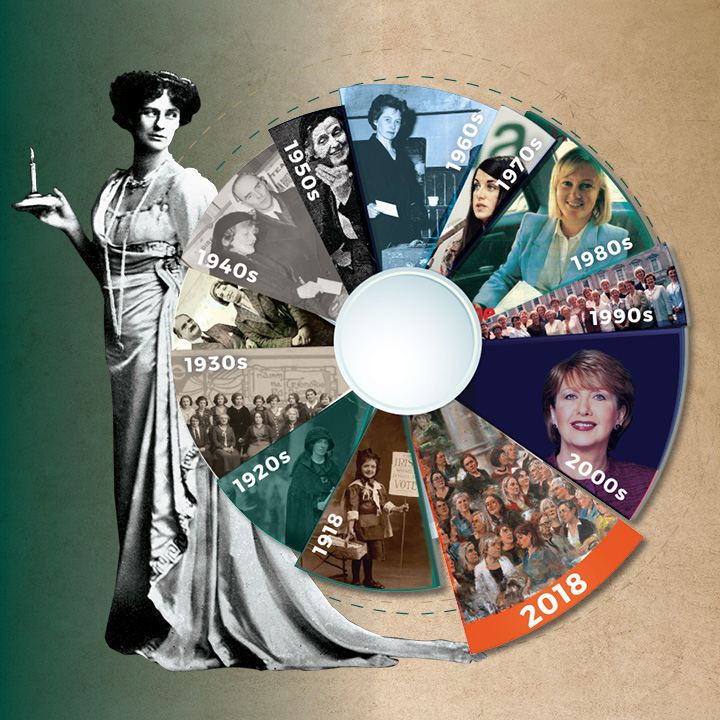
1921
The Pop-Up Museum showcasing 100 years of Women in Politics and Public Life was launched in December 2018 to mark the centenary of the introduction of voting rights for women.

This 100 Year Journey was compiled to highlight the complexity and diversity of women’s experience over the past 100 years.
This is not a definitive list but it is intended that this will be a living document and we encourage people to engage with the project and provide suggestions for inclusion.
Mella Elizabeth Laurie Carroll became the first woman to serve as a High Court Judge when she was appointed in October 1980. She subsequently became the longest serving member of that court. She was also the first woman chairperson of the Bar Counsel.
In 1980, females were recruited to the Irish Army following the passing of the Defence Amendment Act (Number 2). They were paid the same as men and did the same work apart from engaging in armed combat. In 1981, the first eight female cadets in the history of the State received their officer commissions.
Pauline Martin of the Allied Irish Bank branch in Ballybrack, County Dublin became the first woman bank manager in Ireland in 1981.
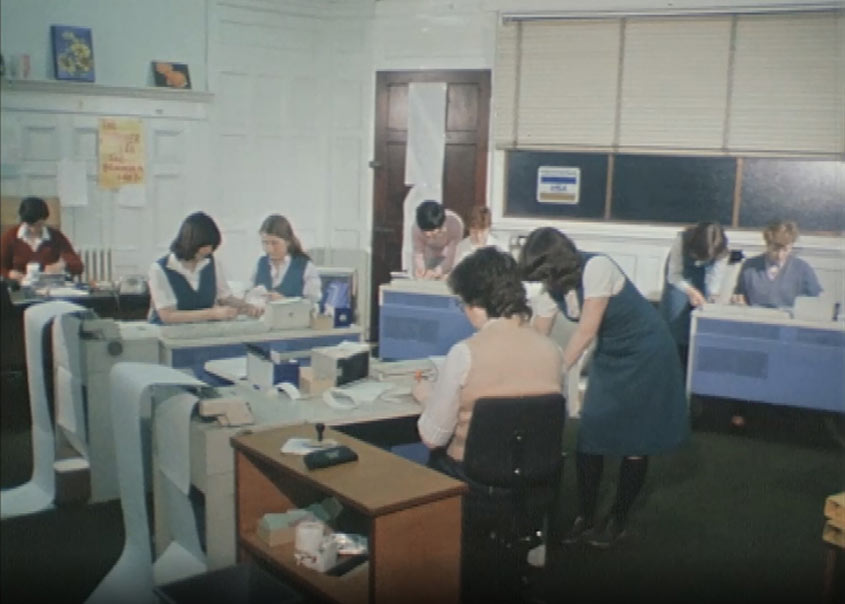
The General Election for the 22nd Dáil took place in June 1981. Fianna Fáil had 78 seats when Charles Haughey was proposed as Taoiseach but he was defeated. Garret FitzGerald was elected Taoiseach and joined with Labour to form a coalition with 80 seats.
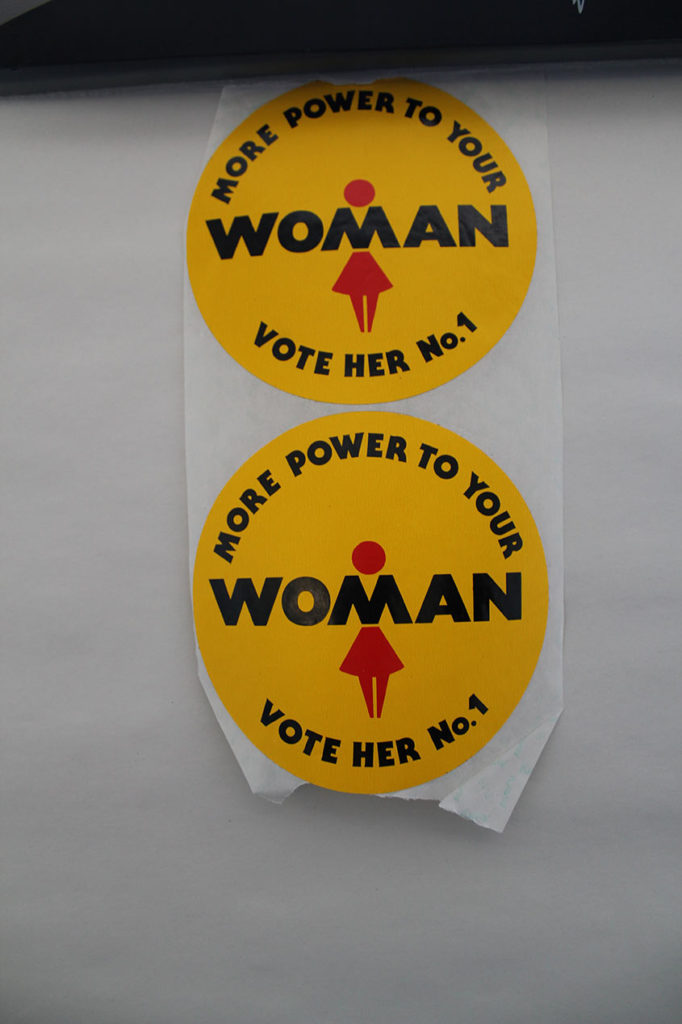
Six women were elected for Fine Gael to the 22nd Dáil. Credit was given to the Fine Gael leader, Garret FitzGerald for his actions at the selection stage. Myra Barry was re-elected along with new TDs: Mary Flaherty, Nuala Fennell, Alice Glenn, Nora Owen and Madeleine Taylor. Fianna Fáil’s Máire Geoghegan-Quinn and Eileen Lemass were joined in the Dáil by Carrie Acheson and former Senator Mary Harney.
Eileen Desmond was elected for the Labour Party. She became Minister for Health and Minister for Social Welfare. She became the 3rd woman in Cabinet, the first woman to hold a senior Cabinet position.
After the general election of February 1982 the 23rd Dáil Éireann returned Myra Barry, Eileen Desmond, Nuala Fennell, Mary Flaherty, Máire Geoghegan-Quinn, Mary Harney, Gemma Hussey and Nora Owen. Fianna Fáil had a minority Government and Charles Haughey became Taoiseach. There were no women in the Cabinet.
The publication of The Way Forward – a policy document from Fianna Fáil – led to the Workers Party withdrawing its support for the Government. Garret FitzGerald called a vote of no confidence and the Government fell. A General Election was called for November 1982 and following it Garret FitzGerald became Taoiseach with Dick Spring, Leader of the Labour Party as Tánaiste.
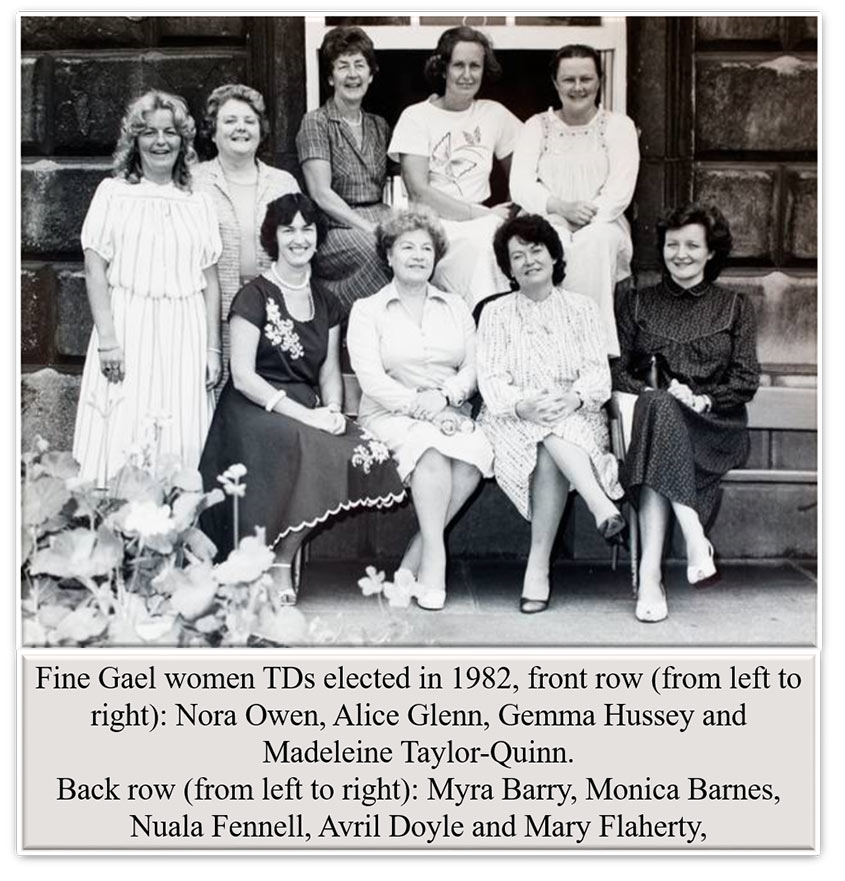
Myra Barry, Nuala Fennell, Mary Flaherty, Madeline Taylor (now married using Taylor-Quinn), Nora Owen, Alice Glenn and Gemma Hussey were re-elected for Fine Gael to the 24th Dáil Éireann, with Avril Doyle and Monica Barnes being elected for the first time. Eileen Desmond was returned for Labour. Máire Geoghegan-Quinn, Mary Harney, Eileen Lemass and Senator Mary O’Rourke – all Fianna Fáil – made up the remainder of the 14 female TDs in the 24th Dáil.
Two of the Women’s Political Association members were given positions within the Government. Gemma Hussey was appointed to Cabinet as Minister for Education.
Nuala Fennell was appointment as the first Minister of State at the Department of the Taoiseach and the Department of Justice with responsibility for Women’s Affairs and Family Law Reform.
In 1983, a Joint Oireachtas Committee on Women’s Rights was set up.
In 1980, Family Planning Act came into effect. The Dublin Well Woman Centre was set up. SPUC (Society for the Protection of Unborn Children) was launched to oppose the introduction of legislation providing for abortion. SPUC was active in providing anti‑abortion speakers in schools and formed a pro‑life amendment campaign. In 1981, the Women’s Pro Life Amendment Campaign (PLAC) was established.
The Courts Act of 1981 widened the jurisdiction of the Courts in family law matters. The Family Law (Protection of Spouses and Children) Act, 1981 was passed. The Criminal Law (Rape) Act (1981) replaced the restrictive definition of rape that had been in place.
Under the Fine Gael-Labour Coalition, a plan to modernise the Constitution was already underway. A Pro-life Amendment Campaign, supported by the Catholic Church, lobbied all political parties to give constitutional protection to the unborn. Abortion was illegal in Ireland and subject to criminal penalty since 1861.
After much debate in the Dáil the original wording drawn up by the previous Fianna Fáil Government of Charles Haughey was put before the people on 7 September 1983. The proposed 8th amendment to the Constitution provided for the insertion of a subsection recognising the equal right to life of the pregnant woman and the unborn.
Following a referendum an eight amendment to the Constitution was approved. This provided for the insertion into the Constitution of Article 40.3.3 which stated ‘The state acknowledges the right of the life of the unborn and, with due regard to the equal right to the life of the mother, guarantees in its laws to respect and as far as practicable by its laws to respect and as far as practicable by its laws to defend and vindicate that right.’ This later became known as the ‘pro life’ amendment.
This amendment ensured that legislation or judicial interpretation would be restricted to allowing abortion in circumstances where the life of a pregnant woman was at risk. The Taoiseach, some members of his party, members of the Labour Party and others, campaigned against inserting this amendment but it passed with a 67% majority.
In 1983, Open Door Counselling was established in Dublin. SPUC later obtained an injunction against Open Door Counselling and the Well Women Centre. Irish women continued to travel abroad for abortions or to conceal pregnancy. In 1984 a number of cases concerning mothers and babies came into the public domain. On 31 January 1984, a fifteen-year-old gave birth alone to her baby boy at an outdoor grotto in the town of Granard, County Longford. Both of them died. Seventy-four days later, the body of a baby boy with multiple stab wounds was found on White Strand near Cahersiveen – his mother was never identified. An investigation by the Gardaí of the events surrounding this discovery subsequently led to what is known as the ‘Kerry Babies Case’. In 1984 Eileen Flynn, was sacked from her teaching job for having a baby outside marriage. That year, the first custom built women’s refuge was opened in Rathmines, Dublin.
In March 1985, the Health (Family Planning) (Amendment) Bill was passed in the Dáil by eighty three votes to eighty, to allow for the sale of contraceptives to all those over 18.
The Hamilton Judgement (1986) ruled that it was illegal to provide information in Ireland that would facilitate abortions in England.
It also obtained an injunction against three students’ unions from publishing information on British abortion clinics.
In 1987, Women’s Information Network, a successor to the Women’s Right to Choose group was set up and offered a non‑directive helpline for women.
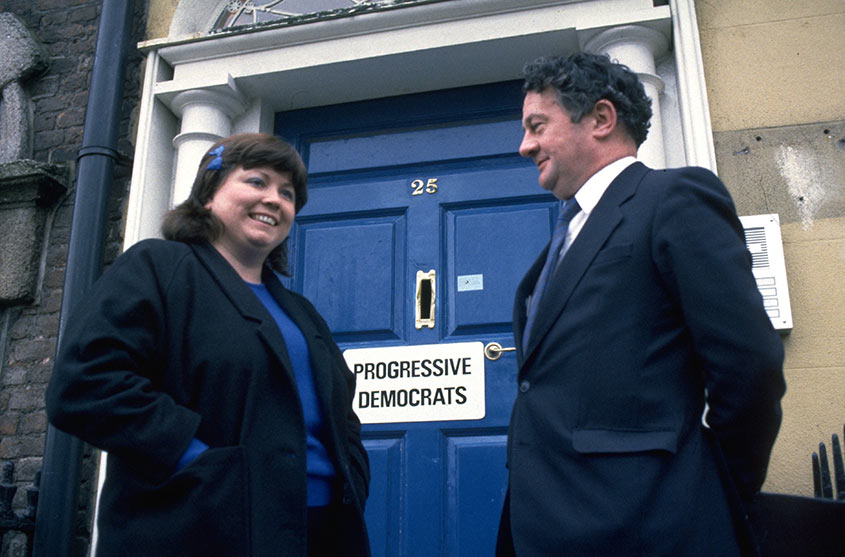
In December 1985 Mary Harney co-founded the Progressive Democrats with Des O’Malley. She had been expelled from the Fianna Fáil Party when she voted in favour of the Anglo-Irish Agreement. Her co-founder, Des O’Malley, was ousted from Fianna Fáil when he refused to vote against the coalition’s bill on the sale of contraceptives.
The party was launched on 21 December 1985 and by 6 January 1986, 4,000 people had enrolled as members. In the General Election of February 1987, seven women stood for election for the Progressive Democrats and four were elected: Mary Harney (Dublin South West), Anne Colley (Dublin South), Geraldine Kennedy (Dún Laoghaire), and Maírín Quill (Cork North Central).
Anne Colley, 35, was the daughter of George Colley, a Fianna Fáil stalwart. Anne had been active in that party since the 1970s but decided to leave and joined the PDs, gaining them a seat (and topping the poll).
Geraldine Kennedy was a 35 year old Irish Times journalist who wrote extensively on women in politics from the 1970s and who was persuaded by Mary Harney to join the party. She was elected in Dún Laoghaire but her running mate Helen Keogh failed to get elected. Monica Barnes (FG) got the fifth seat.
Maírín Quill, originally from Kerry, had played a prominent role in Fianna Fáil in Cork since the 1960s. She left the party, disillusioned with established parties and their failure to bring about political reform, as well as her opposition to Fianna Fáil Leader Charles Haughey. By winning she was described as hitting the Fianna Fáil vote, the Fine Gael vote and took a Labour seat.
The IDA organised a ‘Women in Industry Month’, in which 4,000 participated during the month of October 1985. Grant applications increased by 200 percent as a result.
Following the first claim for damages under the Employment Equality Act, a 15 year old from County Louth won a year’s wages.
The Women in Business Enterprise Agency set up free advice and support for women entrepreneurs. It was shut down by the Fianna Fáil administration the following year.
In 1986, Women Mean Business, An Introduction to setting up your own small business was published by the Office of the Minister of State for Women’s Affairs.
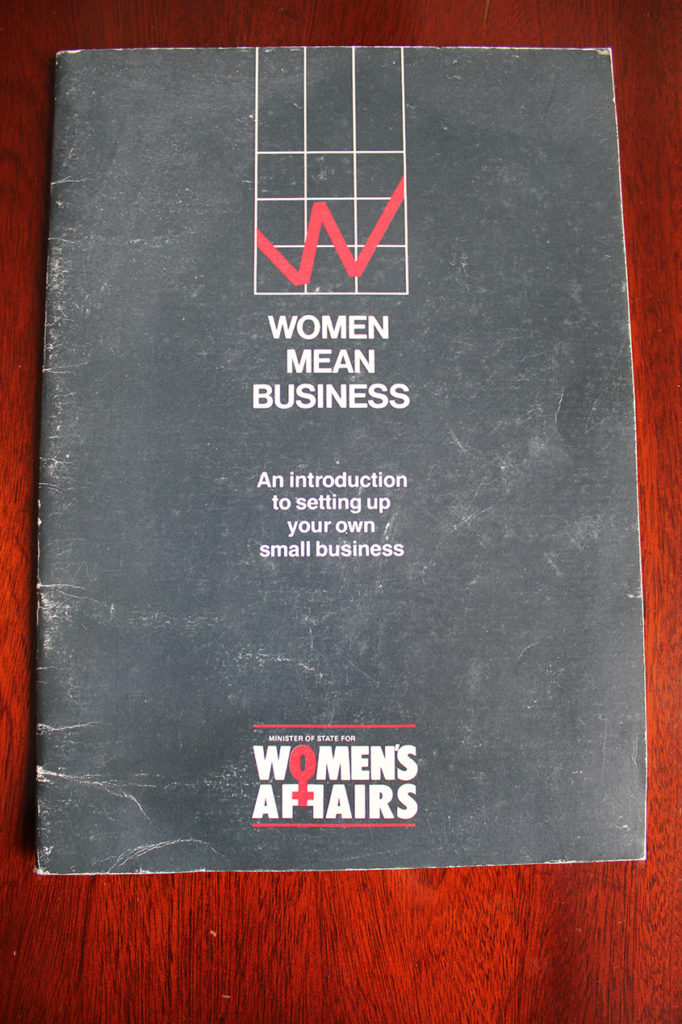
In 1987, the employment rate for women of the working age was 35%.
In 1980, the Divorce Action Group was founded in Dublin to campaign for the constitutional ban on divorce to be lifted. Their literature stated that: ‘the constitutional ban on divorce does not stop marriages dying – it just refuses to grant them a death certificate.’
In the Dáil Charles Haughey said he had no plans for divorce legislation.
In March 1986, the Labour Party’s Divorce Bill was put before Dáil Eireann but was rejected. The following month, the Government published a bill proposing that a referendum be held to remove the constitutional ban on divorce (the Tenth Amendment to the Constitution).
On May 9 the anti-divorce campaign was launched in Dublin. On 13 May the Catholic Bishops printed a million copies of Marriage, Family and Divorce stating that copies would be distributed to every home in the country.
While many of the women urged voters to vote Yes including Gemma Hussey of Fine Gael, others like Alice Glenn, also a Fine Gael TD, campaigned for a No vote, – in her Alice Glenn Report, she said that ‘voting for divorce was like a turkey voting for Christmas.’

On 26 June 1986 a referendum on ‘the dissolution of marriage’ was defeated by 36.5% for and 63.5% against. In July the Government launched the first ever publicly funded mediation service outside the courts to assist families with serious marital difficulties.
The Domicile and Recognition of Foreign Divorces Act, 1986 allowed married women a separate domicile from their husbands.
Following a campaign by the Divorce Action Group a category for ‘separated’ was inserted for the first time in the 1986 census return.
In a campaign supported by many groups (including Mary Flaherty and Myra Barry in Young Fine Gael) for the abolition of the term illegitimacy – for children born outside of marriage – was successful. Under the Status of Children Act 1987 the status of illegitimacy was removed.
The Judicial Separation and Family Law Reform Act 1989 addressed child custody, property and maintenance, judicial separation and assisted reconciliation issues.
There was again a slight increase in female representation in the 25th Dáil following the General Election of November 1987. Fine Gael and Fianna Fáil were equally matched, with five TDs each: Monica Barnes, Avril Doyle, Mary Flaherty, Gemma Hussey and Madeleine Taylor-Quinn, who were elected for Fine Gael, while Máire Geoghegan-Quinn, Mary O’Rourke and Síle de Valera (now representing Clare) were joined by two new TDs, Mary Mooney and Mary Coughlan, for Fianna Fáil. Four female TDs were elected for the Progressive Democrats – Mary Harney, Geraldine Kennedy, Máirín Quill and Anne Colley.
In February 1986, following a Cabinet reshuffle, Gemma Hussey became Minister for Social Welfare. Her appointment was only for a matter of months, as in December 1986 Fine Gael and Labour could not agree the terms of a budget and they decided to break the coalition on 20 January 1987. In the election that followed, Fine Gael suffered a substantial loss of seats and Garret FitzGerald resigned as Leader and was replaced by Alan Dukes.
Charles Haughey became Taoiseach again, this time with a minority Government. He appointed Mary O’Rourke to his Cabinet as Minister for Education. She remained in that position for the duration of the 20th Government of Ireland. 1987 Mary O’Rourke appointed Minister for Education becoming the 5th Cabinet Minister – Gemma Hussey retired from politics in 1989. She was immediately appointed to the Council of State by President Hillary.
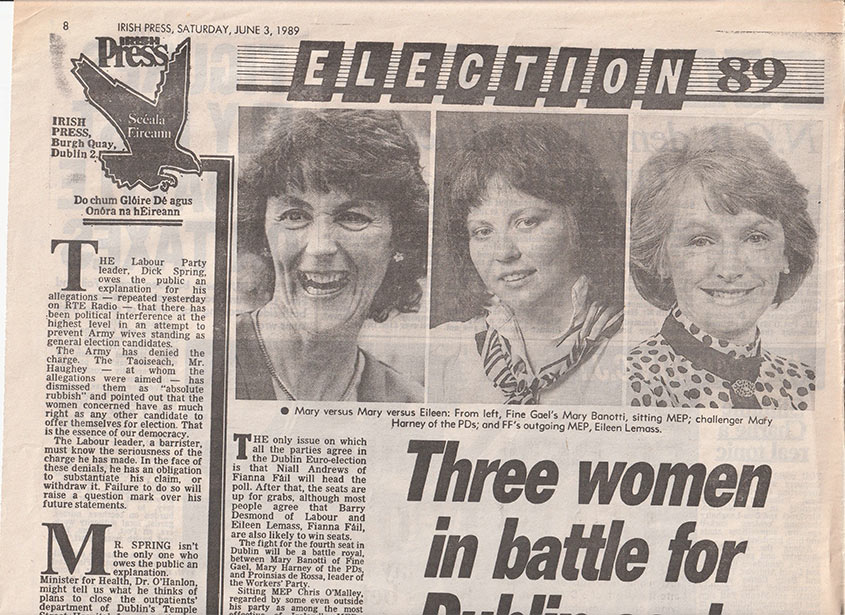
The General Election for the 26th Dáil took place on 15 June 1989.
Fianna Fáil entered into Coalition with the Progressive Democrats, as they were seven seats short of an overall majority. Mary Harney became Minister of State with responsibility for the Office for the Protection of the Environment. During this time, she oversaw the establishment of the Environmental Protection Agency and brought in legislation to ban fuel that was causing smog.
The returning female TDs were Monica Barnes (FG), Mary T Coughlan (FF), Síle de Valera (FF),Nuala Fennell (FG), Mary Flaherty (FG), Maire Geoghegan-Quinn (FF), Mary Harney (PD), Mary O’Rourke (FF), Máirín Quill (PD), Madeline Taylor-Quinn (FG), and Nora Owen (FG).
Two new female TDs were elected: Theresa Ahern (Fine Gael) and former Senator, Mary Wallace (Fianna Fáil), both of whom were already political veterans.
In the European Parliament Election, Mary Banotti (FG) and Bernie Malone (Lab) were elected.